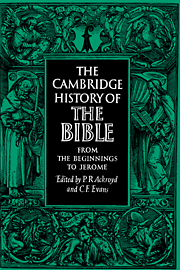1 - THE BIBLICAL LANGUAGES
from I - LANGUAGE AND SCRIPT
Published online by Cambridge University Press: 28 March 2008
Summary
With the exception of several chapters of Daniel and Ezra, which are written in Aramaic, the language of the Old Testament is Hebrew. The Creation story (cf. Gen. 2: 19 ff.) and the story of the tower of Babel (Gen. 11) imply that Hebrew was the original language of mankind. When we turn from folk legend to linguistic origins, however, Hebrew does not appear to have been the original language of the Hebrews themselves, but the language of the inhabitants of Canaan who were conquered and partly displaced by Joshua; it is more accurately described once in the Old Testament (Isa. 19: 18) as ‘the language of Canaan’ (it is usually referred to by the Old Testament writers as ‘Jewish’, e.g. Isa. 36: 11; 2 Chron. 32: 18). The more primitive nomad desert tribes from across the Jordan appear to have been gradually assimilated to the culture and civilisation of the conquered Canaanites and to have adopted their speech as well as much in their culture, if not their manner of life; we do not know the precise nature of the original language of the Hebrew invaders, but it was probably a tribal dialect of the Old Aramaic, with possibly close affinities with the speech of Canaan (cf. Deut. 26: 5 RSV). The name ‘Hebrew’ to describe the language of the Old Testament is derived from the ancient name of the Israelites ‘Ibriyyīm, explained in the Old Testament as a patronymic (Gen. 10: 21). The name, in the form Habiru, is now known from Mari (second millennium B.C.) and many other second-millennium cuneiform sources. Various modern etymologies explain the word as 'the dwellers beyond the River', i.e. either the Jordan or (more probably) the Euphrates. (Abraham was born 'beyond the River' in this latter sense.)
Keywords
- Type
- Chapter
- Information
- The Cambridge History of the Bible , pp. 1 - 11Publisher: Cambridge University PressPrint publication year: 1970

